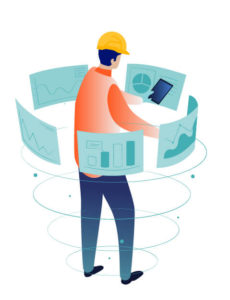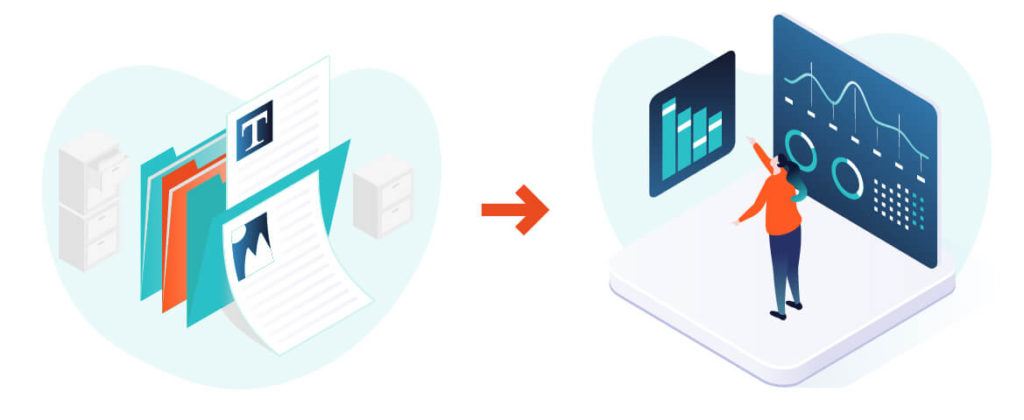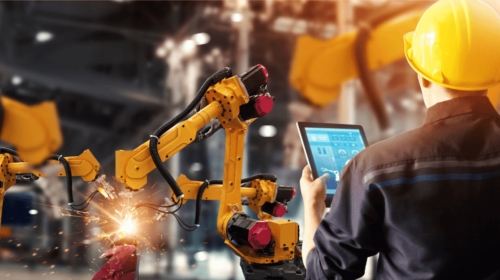
5 Common Questions About Digital Manufacturing Platforms
Doubting the added value of a digital manufacturing platform? Read the answers to the five most frequently asked questions.

Performing day-to-day factory work requires the use of many specialized tools. These tools largely lead a separate existence, which has many obvious downsides. Tools often work in distinct ways and are reached through various entry points, causing information to be scattered. A digital manufacturing platform is a piece of software that gathers everything you need to run your factory in a centralized digital environment.
Digital manufacturing software generally consists of at least the following components:
- A knowledge database where analyses, checklists, articles and other knowledge is stored
- A task management system that shows which work has to be done, and where it has to be done
- A system containing related information about areas, machines and equipment
Let’s explore the benefits a digital manufacturing platform can bring to your factory through the answers to five frequently asked questions:
1. Why is a single platform preferable to using specialized tools?
Factory operators need to use various tools to perform their work. These are accessed at different places, and can exist both digitally, and on paper. This can lead to operators getting frustrated, as they may not know where they have to go to perform a task.
Digital manufacturing platforms like 4Industry gather all specialized tools in a single piece of software. You can find tools for performing root cause analyses, doing deviation reports, planning tasks, and much more. This doesn’t mean you have to discard all your specialized tools. Instead, a one-stop-shop is created, where users can effortlessly find everything they need. Tools can be accessed anywhere through the same, intuitive entry point, making it easy for operators to know where they need to be to perform a task.
2. What makes a DMP different from a MES?

A manufacturing execution system (MES) connects what you should do – complete an order of a certain quantity, for instance – to what you’ve actually done. A MES is tied to one plant or production line, and is therefore inherently limited. It monitors breakdowns and deviations, but it can’t contain every bit of knowledge about them. A digital manufacturing platform keeps tabs on both things simultaneously. The contents of a DMP are stored in a global database, opening up the possibility of connecting to other factories.
Because knowledge can be stored indefinitely in a database, it can even be used to educate a new generation of operators. Instead of having to rely on an experienced worker to instruct them, new operators can learn how to use a machine or repair a breakdown by using documented knowledge. Above all, having a centralized knowledge database ensures that knowledge doesn’t leave the company when an older generation of workers goes into retirement.
3. I already have an ERP, why do I need a digital manufacturing platform?

ERPs are not made to support DMP functionalities, and cannot be repurposed to do so. Although an ERP is used on a global scale just like digital manufacturing software, its use is limited to finance. An ERP is not made for storing knowledge articles, and doesn’t contain information about technical deviations and shop floor analyses. It has neither the flexibility, nor the scalability that characterize digital manufacturing software.
Luckily, both pieces of software can be complementary. Integrations can be set up so that information flows from the DMP to the ERP, and vice versa. A DMP can, for example, update an ERP about how many spare parts are used during maintenance.
4. Is a digital manufacturing platform scalable?
Within each manufacturer, factories across different countries and continents generally operate in relative isolation from each other. Digital manufacturing software has caused a revolutionary shift in this status quo. Knowledge is no longer confined to a single plant, but can be shared across the world.
The more you make use of your DMP, the more knowledge will pour into the central database. Instead of having to reinvent the wheel every time a problem occurs, a solution can be reached in a matter of minutes.
The result of a root cause analysis done in one plant, can be instantly shared with plants that use the same equipment. As every operator in your factories uses the same platform, disparate factories will become a tightly-knit network. Struggling plants can tap into the knowledge of well-functioning plants. Thus, the way work is done on your plants is collectively optimized and standardized.
5. Is digital manufacturing software future-proof?

In the past decades, manufacturing tools were regularly replaced by new and improved tools to support new processes. Paper was discarded in favor of Excel, which then had to make place for Access databases, which were in turn discarded for specialized tools. This way of updating tools was self-evidently unideal, as operators had to familiarize themselves with an entirely new way of working after each switchover.
Digital manufacturing software like 4Industry is, on the contrary, perfectly future-proof. The software contains core capabilities relating to tasks, knowledge, and so on, but these are constantly being improved and expanded on.
New features are built on top of each other, without breaking existing configuration that was done to fit the platform to a particular manufacturing process. It is thereby able to adapt to changed circumstances.
Your company grows as the platform grows, and you don’t have to fear about the one outpacing the other. Manufacturers have the ability to change the platform’s processes and workflows as much as the they like. Flexibility is a given, and continuous evolution and adaptation are guaranteed.
Related Articles

The 4Industry Everest release is here!

The best new features from the 4Industry Elgon release

